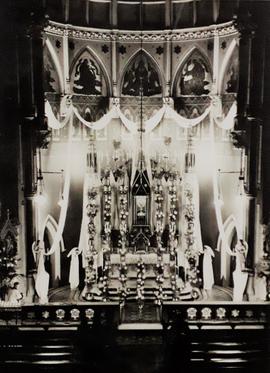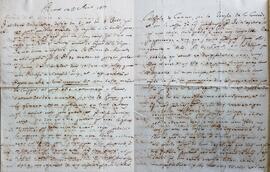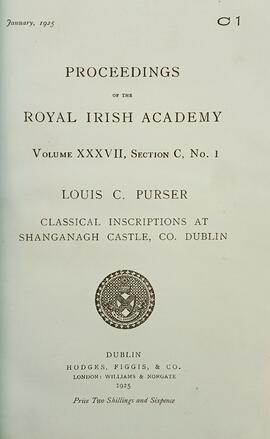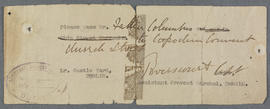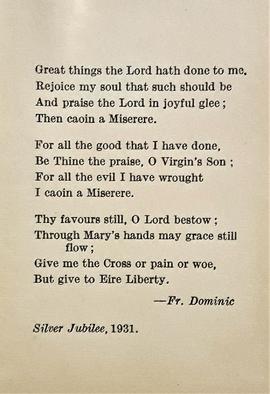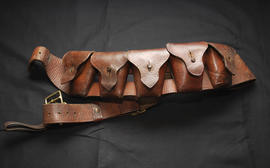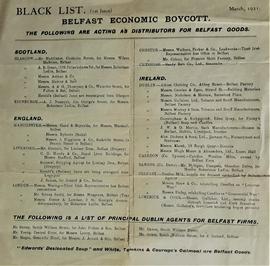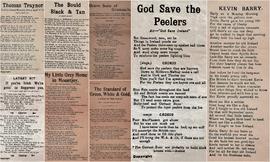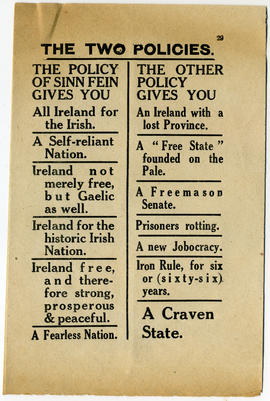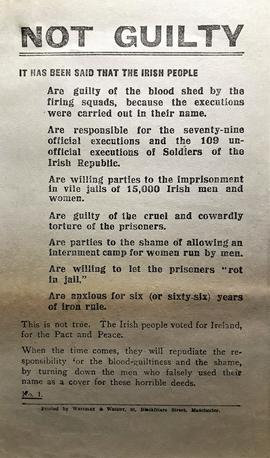Photographic prints of the High Altar, St. Mary of the Angels, Church Street. The church and altar appear to be decorated for the Forty Hours’ Devotion ('Quarant’ Ore'). A wider view of the decorated church interior is pasted onto the reverse of one of the larger prints.
A file of letters from Cardinal Ercole Consalvi, a senior official in the Roman Curia. All the letters are written from Rome. One letter is dated 6 September 1801 with the remaining four seemingly dating from May to August 1817. The letters are unsigned and a few may be incomplete. With a covering envelope annotated ‘Consalvi’.
A bound volume of selected editions of the ‘Proceedings of the Royal Irish Academy’. The spine has a gilt title which reads ‘Pamphlets / B 6’. The editions mostly comprise academic papers on various Irish antiquities and monuments and assessments of historical sources. The topics include ‘A calendar of the Register of Archbishop Fleming’ (1912), ‘Four brooches in the library of Trinity College Dublin’ (1915), ‘Classical inscriptions at Shanganagh Castle, County Dublin’ (1925), and ‘The Diocese of Ross and its ancient churches’ (1932). The editions were published by Hodges Figgis & Company in Dublin.
Passes signed by Mervyn Richard Wingfield, 8th Viscount Powerscourt, Assistant Provost Marshal, Dublin, permitting Fr. Aloysius Travers OFM Cap. and Fr. Columbus Murphy OFM Cap. to travel between ‘Dublin and England via North Wall or Kingston’ and to the ‘Capuchin Convent, Church Street’.
The poem reads:
‘Thy favours still, O Lord bestow;
Through Mary’s hands may grace still flow;
Give me the Cross or pain or woe,
But give to Eire Liberty’.
A leather bandolier reputed to have been used by an Irish Volunteer during the 1916 Rising. Retrieved from the gallery of St. Mary of the Angels, Church Street, Dublin. The bandolier has five pouches for the storage of ammunition.
Circular letter from Seosamh Mac Donnchadha (Joseph MacDonagh), Minister for Labour, Dáil Ėireann, to the Superiors of all Religious Houses in Ireland, enclosing a copy statement, written by a Belfast priest, detailing ‘the Orange atrocities committed on Catholic workers and others last July and August’. MacDonagh asks the Religious Superiors to use ‘their wide influence to assist in the rigid enforcement and maintenance of the Belfast Trade Boycott’. MacDonagh was elected unopposed as a Sinn Féin MP for the Tipperary North constituency at the 1918 general election. He was Director of the ‘Belfast Boycott’, an attempt in 1920–21 to boycott goods from Ulster that were being imported into the south of Ireland. With a printed flier titled ‘Black list, Belfast Economic Boycott’ listing the principal firms acting as distributors for ‘Belfast goods’ in Dublin and in other parts of Ireland.
A collection of street ballad leaflets assembled by Fr. Stanislaus Kavanagh OFM Cap. (1876-1965), a Capuchin friar, in 1921. The handbills relate to events in the War of Independence from 1919-21. This contentious period produced its share of controversial literature mainly in the form of leaflets, handbills, ballads and other forms of popular street literature. The treatment of prisoners during the War of Independence was the subject of political and social outrage and was reflected in popular ballads celebrating the lives of Kevin Barry, Patrick Moran, Thomas Traynor and other republican prisoners executed in Mountjoy Jail in Dublin and in other locations following courts martial from 1920-1. Most of the ballads recounted popular stories told in simple metre, and set to (mostly) traditional airs. The ballad titles include:
'Kevin Barry'
'The Bould Black & Tan'
'God Save the Peelers'
'Commandant McKeown'
'My Little Grey Home in Mountjoy'
'Thomas Traynor / Died for Ireland / Mountjoy Prison / April 26 '21'
'Brave sons of Granuaile'
'The Standard of Green, White & Gold / A Song of Truce'
'Latest Hit / If you're Irish We're goin' to Suppress you'
Six uniform handbills in the Republican interest, starting with:
The Till of the people …. 2 copies
The Irish Free State brands Irishmen who refuse to be slaves. 2 copies
Make the war-mongers pay for the war ... If England ordered the war don't you think England ought to pay for it? 2 copies
Merciless tigers in their dealings with unarmed Republican prisoners. Spineless worms in their dealings with English ministers. That's what O'Higgins and Mulcahy are. 2 copies.
620,283 Irish voters went to the Polls on June 16th, 1922. Not a solitary one of these 620, 283 voters wanted war. But one English voter, Winston Churchill, wanted war and he had his way. That is what is meant by "The Will of the People". 5 copies
The two policies. The policy of Sinn Fein gives you ... a fearless nation. The other policy gives you ... a craven state. 2 copies.
Do you believe that while there is a single hungry child in Ireland, the sum of £37,865 per year of the Irish Peoples’ money should be expended on Tim Healy? 2 copies.
Address to the Dublin Brigade by the Officer Commanding, signed by Oscar Traynor.
An Anti-Treaty handbill. The text reads: ‘It has been said that the Irish people are guilty of the blood shed by the firing squads, because the executions were carried out in their name ... This is not true ... when the time comes, they will repudiate the responsibility for the blood. Guiltiness and The shame, by turning down the men who falsely used their name as a cover for these horrible deeds. Printed in Manchester by Whiteley & Wright. Titled ‘No. 1’ in a series.

